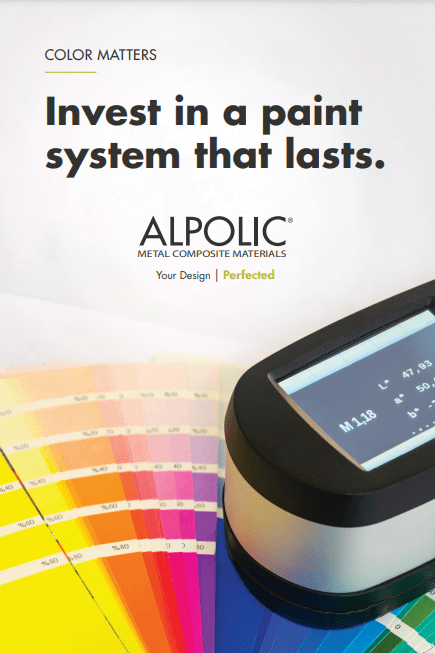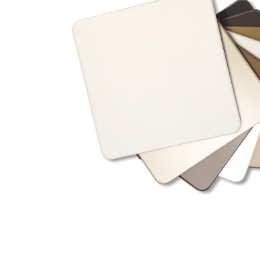What Does Standard Stock and Custom Production Mean?
ALPOLIC, a global leader in metal composite material (MCM) manufacturing, takes pride in having the widest selection of stock materials. Sales managers like Jack Finn have acknowledged the distinction between standard stock inventory and custom production can be a challenge for clients. “I often field questions on our stock list, which is hundreds of materials of various sizes, thicknesses, cores, and colors. But not all stocked colors are standard in all sizes, thicknesses, or cores. So, I help them navigate our inventory and, if need be, assist with custom run production.”
Jack, who manages corporate identity (CID) in Eastern Canada, notes that ALPOLIC’s expansive program list often drives what is considered stock. “We work with some of the biggest brands in the world to help streamline their design process. So every store, dealership, restaurant, or hotel can have the same recognizable look while maximizing panel yield in design.” Though, he adds, not every stock color is associated with CID.
“Ultimately, it’s important to define what makes up MCM to recognize what variables exist,” says Jack.
Paint Type
With regards to paint type, Jack says, “We always start with the look. Understanding finish types is imperative to understanding the finished product.” In architectural applications, fluoropolymer paint systems are the most common and most recommended. These include a 100% FEVE resin (brand name Lumiflon) and a 70% PVDF dispersion (brand name Kynar). Both meet AAMA 2605, the highest standard for architectural coatings.
There is also the family of polyester paints, including high-performance polyester, siliconized polyester, super polyester, and others. These paints are more susceptible to UV degradation.

Color
ALPOLIC MCM provides a seemingly infinite palette of colors. A wide variety of paints even have additives such as mica flakes or pigments to make dynamic visuals like sparkling shimmers or color-changing prismatics. The crisp lines needed for multi-color panels are made possible with ALPOLIC’s state-of-the-art die coating process. Despite the nearly endless color possibilities, Jack says that the image transfer process makes the largest impression on his customers. “Our Timber Series is a big favorite. The natural look without the same maintenance, installation, or cost concerns. We even have marble and rusted steel looks, too.”
Gloss
From understated to standout, ALPOLIC has the widest gloss range in the industry. Jack notes gloss can even be a factor in color perception. While the Matte Series can produce gloss levels as low as 6, typically, finishes fall into low (30 gloss), medium (50 gloss), to high (70 gloss).
Skin Material
MCM is the broad category for metal composite materials. The most typical is painted ACM or aluminum composite material, but MCM also includes natural metals such as copper, zinc, stainless steel, and titanium. And there is also a class of anodized aluminum that provides a deeply lustrous look in a tough as nails finish.
Skin thickness
The typical skin thickness of ACM in architectural applications is 0.020”. A thinner 0.012” skin can be used in applications such as signage and canopies. There is also a special panel that is 0.005” thick, predominantly used for flat, interior applications. For the toughest applications, ALPOLIC®/HD is available with a skin thickness of 0.032”.
Core Material
There are two main types of core material: PE (polyethylene) and FR (fire-resistant). “We recommend ALPOLIC®/fr core when applied over 40 feet, per the IBC [International Building Code],” states Jack. “Of course, local code requirements take precedence.” Within the polyethylene core category, there is the common solid core and the specialty foamed core used with the .005 skin.
Sheet widths
The common aluminum coil widths are 40, 48, 50, 51, 60, and 62 inches. Natural metal skins may have different widths.
Sheet lengths
The potential lengths available from ALPOLIC can run sheets from 72” minimum to a maximum of 288”, though the common lengths are 122”, 146”, and 196”.

So what is standard stock inventory?
“We have pages and pages of stock inventory that is updated regularly, so our customers can navigate tight lead times,” assures Jack. “But what takes some explanation is that, typically, we carry our stock finishes in a limited combination of attributes. We couldn’t store the infinite combinations of size, core, and color.”
Custom Production Explained.
“Sometimes our customers need a new custom color formulation. But with hundreds of options to choose from, they can often find a look that meets their needs from our stock list options. However,” Jack often clarifies, “if a variable such as gloss, core, skin thickness, or size changes from what is on the Standard Stock Inventory list then the new item is considered custom.” Custom materials have 1,000 ft2 minimum production runs and potentially, increased costs involved.
For example, BNT bone white is stocked in several widths, lengths, and cores. 4mm x 50 x 146, 4mm x 50 x 196, 4mm x 62 x 146 and 4mm x 62 x 196, in PE core are standard. In FR, 4mm x 50 x 196, 4mm x 62 x 196 are standard. All combinations are in a 30 gloss, fluoropolymer paint system.
“I might say BNT is a stock color, but if my customer is asking for a 3mm, 48” wide sheet, I inform them that it is a custom production,” says Jack. “Any difference in the combination of attributes from what is standard stock inventory, this becomes a custom production run.”
Another example would be TBL black. It is standard in 3mm x 51 x 122 and 4mm x 62 x 196, both in PE core and 70 gloss fluoropolymer paint. If other widths or FR core or polyester paint is required, this request is custom.
“Ultimately, the fact that a color is on the Standard Stock Inventory list does not mean it is stocked in all sizes or thicknesses or cores. Changes to standard result in custom production. But that doesn’t always mean it will cost more,” reassures Jack. “A large enough purchase order can still capitalize on standard stock pricing.”
ALPOLIC is known for quality products and exceptional service and support. Your ALPOLIC Sales Manager or Customer Service representative will be happy to assist your specific project requirements. Order free samples today.
 ALPOLIC Color Matters Brochure
ALPOLIC Color Matters Brochure





